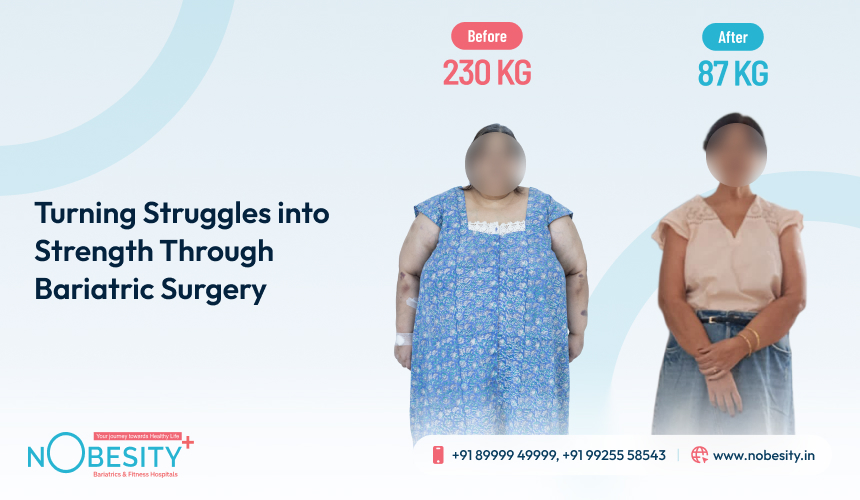From 230 Kg to 87 Kg: How Bariatric Surgery Gave Mrs. Khatri a New Beginning


Some stories remind us how gradual changes can quietly take control of life — Mrs. Khatri’s is one of them. After her marriage and childbirth, she gradually developed a pattern of emotional eating. In the early years, her weight increased by around four to five kilograms annually. Over time, this steady gain began to accelerate, and during the last four years, she started gaining nearly fifteen kilograms per year. By the time she arrived at KD Hospital, her weight had reached 230 kilograms.
The excess weight had severely limited her mobility. Walking more than two steps required her to stop for rest. Even simple household movements, like going from the dining room to the drawing room, meant taking several breaks. Standing up from a chair could take up to fifteen minutes. She also experienced swelling in her legs and breathlessness with even minimal exertion, which made daily activities increasingly difficult.
Obesity had affected nearly every part of her life — physically, emotionally, and socially. Still, she wished to regain control and find a path back to health. Under the guidance of an experienced bariatric surgeon and a multidisciplinary medical team, a comprehensive obesity treatment plan was developed. With structured supervision and compassionate care, her journey toward recovery through bariatric surgery gradually.
There came a stage when even the simplest actions demanded extraordinary effort. Mrs. Khatri’s weight had begun to restrict her movements so severely that walking more than two steps left her breathless. Simple household tasks—like moving from the dining room to the drawing room—required multiple pauses to rest. Standing up from a chair could take nearly fifteen minutes, turning everyday routines into exhausting trials of strength and patience.
Each movement reminded Mrs. Khatri of how much her body had changed. Swelling in her legs made it painful to stand for long, while breathlessness on minimal exertion drained her energy. Gradually, her world began to close in. The spaces she once moved through freely became filled with hesitation and fatigue.
What weighed most, however, was the emotional burden. The frustration of needing help for basic tasks and the fear of further decline took a quiet toll on her spirit. For many individuals living with severe obesity, moments like these mark the point when seeking obesity treatment becomes not just an option but a necessity.
Even in this challenging phase, Mrs. Khatri’s determination remained. Beneath every pause and every breath was the belief that she could still regain control of her life—with the right medical guidance and expert care. That belief eventually brought her to a bariatric surgeon at KD Hospital, where a comprehensive weight loss surgery program would help her rediscover movement, confidence, and health once more.
There are moments in every recovery story when medicine meets sheer human will. For her, that moment came on 17 May 2023, the day she was admitted to KD Hospital under the care of Dr Manish Khaitan, an experienced bariatric surgeon known for handling complex obesity treatment cases.
By then, her condition had become critical. She struggled to move, her breathing was laboured, and her body needed urgent care before any surgical step could even be considered. As the medical evaluation began, a new challenge emerged—her weight exceeded the limit of certain diagnostic tools. The hospital’s CT scanner, with a maximum capacity of 220 kilograms, could not accommodate her 230-kilogram frame. What seemed like a small technical detail turned into a major obstacle, delaying immediate surgical planning and demanding an alternative approach.
The situation could have been discouraging, but what followed showed just how resilient both the patient and the medical team were. Instead of stepping back, the team adjusted protocols and coordinated alternative assessments to ensure her safety. Every plan, every precaution, was designed around her individual needs.
It was also a moment of reflection. She had been advised of weight loss surgery almost a year and a half earlier, but had declined out of hesitation and self-doubt. Back then, fear overshadowed hope. Now, seeing the commitment of her care team, she realised this was her second chance—a chance she was ready to take.
That shift in belief was the beginning of change. With renewed trust and a coordinated medical plan, the path toward surgery no longer felt uncertain. It felt possible. And that single shift—from doubt to determination—became the true start of her transformation.
For Mrs. Khatri, this phase became more than medical preparation—it was the moment she began to truly believe in her recovery. After her admission, the NObesity team at KD Hospital designed a structured 16-day inpatient program to help her regain physical stability and emotional strength before surgery. Every aspect of the plan was built around safety, confidence, and care, ensuring her body and mind were ready for transformation.
Her journey during those sixteen days reflected what effective obesity treatment is truly about—personalised attention, not just procedures. The team worked on multiple fronts to optimise her condition and rebuild trust in herself and in the process.
The 16-day program included:
By the end of those sixteen days, her results spoke for themselves. She had lost 29 kilograms, bringing her weight within the safe limit for diagnostic evaluation. More importantly, she regained something far more valuable—confidence. What once felt impossible now seemed within reach.
Her ability to undergo safe preoperative testing was only part of the achievement. The real progress lay in her renewed mindset. The fear that had once held her back was replaced with faith in her medical team and in her own strength to change. Her journey during those sixteen days marked a quiet turning point — one that words can only describe so far. To truly appreciate the difference those days made, take a look at her transformation below.

These sixteen days were a turning point—proof that even before surgery, the right combination of counselling, nutrition, and medical support can set the foundation for lasting transformation.
And with her body now optimised and her spirit ready, she was finally prepared to take the next step—the surgery that would redefine her life.
By early June, every step of preparation had led to this decisive moment. On 3 June 2023, she was taken for bariatric surgery under the leadership of Dr Manish Khaitan and the expert surgical team at KD Hospital. The weeks of structured counselling, medical optimisation, and supervised diet control had made her body ready and her mind steady for the procedure ahead.
The surgery was performed smoothly and without complications. Each phase of the operation reflected the care and planning that had gone into her preoperative journey. When the procedure concluded successfully, it marked a quiet but powerful milestone—proof that persistence, preparation, and expert medical coordination could turn uncertainty into progress.
Mrs. Khatri’s recovery was closely monitored in the days that followed. Within just three days, she was ready to be discharged. Before leaving, she took 20 to 25 independent steps—small in distance but immense in meaning. For someone who once took fifteen minutes to stand, those steps symbolised regained strength and control.
For the medical team, her progress reaffirmed the importance of a structured, multidisciplinary approach to obesity treatment. For her, it marked the first tangible proof that change was no longer an aspiration—it was happening.
That walk from the hospital room to the corridor wasn’t just her first after surgery—it was the first step into a new life waiting beyond the recovery room.
The day she took her first twenty steps after surgery, it wasn’t just a test of strength—it was the start of a new rhythm to her life. Those steps became symbols of what discipline, expert care, and belief can achieve when they come together.
Over the next two years, her recovery turned into a complete transformation—steady, inspiring, and far-reaching.
Highlights of her transformation:
What makes her journey extraordinary isn’t just the weight she lost—it’s the life she regained. Each step forward became a reflection of resilience and recovery working hand in hand.
Her progress reminds us that bariatric surgery isn’t simply about reduction—it’s about restoration. The restoration of movement, of confidence, of dignity, and above all, of possibility.
Mrs. Khatri’s journey stands as a reminder that true transformation begins long before the operation—it begins with trust, preparation, and the right guidance. Her story reflects how weight loss surgery, when supported by psychological care, clinical nutrition, and medical optimisation, can give people far more than movement; it can give them life in motion again.
Her recovery underscores the power of a multidisciplinary approach where surgeons, counsellors, dietitians, and physicians work together toward a shared goal—sustainable change. Through structured preoperative preparation and continuous postoperative support, she moved from complete immobility to living independently, confidently, and without reliance on medication.
Behind every success like hers lies a dedicated ecosystem of expertise and empathy—the kind of integrated bariatric care that centres like NObesity have refined over years of experience.